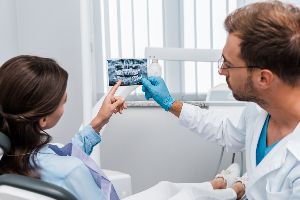
If you have trouble sleeping and are always tired in the morning, you may have a condition known as sleep apnea. Thankfully, your dentist may be able to diagnose the problem on your next visit. The following guide will discuss the basics of what sleep apnea is, how it can impact your health, and how it's treated.
What Is Sleep Apnea?
Though sometimes associated with snoring, sleep apnea is a distinct condition. It's a sleeping disorder during which the person's breathing stops and starts as they sleep. There are several varieties of the affliction.
Obstructive sleep apnea is the most common and is when the soft tissue at the back of your throat blocks your airway during sleep. The second type is central sleep apnea, which is a failure of the nervous system to tell your body to breathe. It's often associated with neuromuscular diseases like ALS, or is seen in stroke victims. Finally, complex sleep apnea syndrome is a combination of the two.
What Problems Can It Cause?

The mild issues caused by sleep apnea include loud snoring, interrupted sleep, and daytime tiredness. These can all impact your quality of life.
More serious problems include the increased risk of heart trouble and high blood pressure associated with the condition. Combined, these problems can have a significant impact on a patient’s overall health.
What Are the Risk Factors and Causes of Sleep Apnea?
Obesity is one of the main risk factors for sleep apnea, though it isn’t the only one. Age, nasal congestion, and a smoking habit can also contribute to the risk of the condition.
It’s also believed that sleep apnea can run in the family, so if family members experience it, be alert for symptoms of your own. Finally, men are up to three times more likely to suffer from sleep apnea than women.
What Can You Do About it?
Milder cases can often be treated with some lifestyle changes. Losing excess weight and quitting smoking, for example, may alleviate the issue.
For more serious cases, there are several kinds of treatment. A CPAP machine, for example, is a device worn during sleep to keep air flowing into the lungs. There are other, less cumbersome oral devices designed to keep your throat open, some of which can be recommended by your dentist. In worst case scenarios, there are several types of surgery to help make breathing easier.
If you believe you might have sleep apnea, schedule a consultation with Patrick T. Hunter, DDS of Dayton, OH. He and his team can diagnose your condition and suggest a plan of treatment. He has over 15 years of experience helping patients of all ages, from routine tooth extractions to dental implants and denture fittings. Visit his website for more information about his services, or call (937) 890-8957 to schedule an appointment with the dentist.
About the Business
Have a question? Ask the experts!
Send your question

